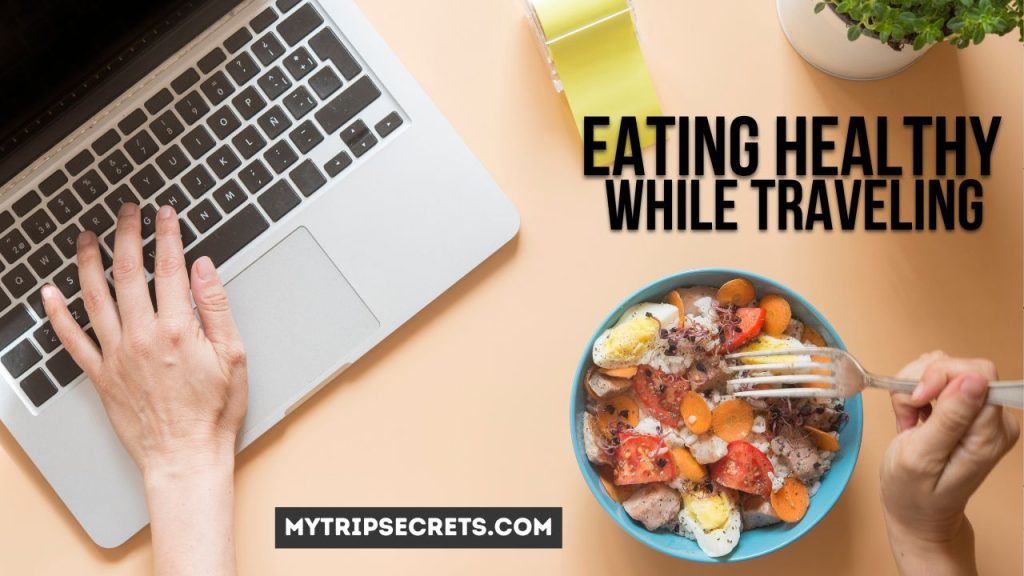Business travel can wreak havoc on your diet and exercise routine. When you’re on the road for work, it’s easy to fall off the healthy eating waggon due to the long hours, client meals, stressful meetings, and handy fast food. But you shouldn’t neglect your health and wellness routines because you have to travel for work. Eating healthy, balanced meals when travelling is possible with little preparation and dedication, so you won’t feel sluggish and overweight when you get home. This article will provide tips and strategies for eating healthy meals and snacks no matter where your work takes you.
Pack Smart Foods in Your Carry-On
One of the best ways to ensure you have healthy options while traveling is to pack nutritious snacks and mini-meals in your carry-on bag. This gives you food at your fingertips if you get stuck on a delayed flight or need fuel between client meetings. Some smart carry-on food options include:
- Fresh fruits and vegetables – opt for apples, oranges, carrots, snap peas, etc. Things that travel well without refrigeration.
- Mixed nuts and seeds
- Protein bars or nutrition bars
- Beef or turkey jerky sticks
- Canned tuna, chicken or salmon
- Hummus with pretzels or veggie sticks
- Overnight oats in a mason jar
- Protein powder single servings
Expert Advice On Eating Healthy While Traveling for Work
Once you know where you’ll be traveling, spend some time before your trip researching healthy restaurants and cafés nearby. Look for restaurants that offer entrée salads, lean protein sources, vegetarian options, and nutritious sides. Find places that accommodate specialized diets if needed.
Below table provides examples of cuisines and dishes that can be healthy options when dining out for work travel.
| Cuisine | Healthy Dishes to Order |
|---|---|
| Japanese | Sashimi, miso soup, seaweed salad, brown rice sushi rolls |
| Mexican | Fajita vegetables, grilled chicken or steak, extra salsa/pico de gallo, black bean dishes |
| Italian | Shrimp scampi, chicken Parmesan, side salads, minestrone soup |
| Thai | Stir frys with tofu and veggies, vegetable curry dishes, broth-based soups |
| American | Grilled chicken sandwich, turkey burger, salads, roasted veggie sides |
| Indian | Tandoori chicken, vegetable korma, dal, raita cucumber salad |
Use restaurant and café finder apps or websites like Yelp to locate well-reviewed healthy eateries near your hotel or office. This research makes it easier to suggest dining options when coworkers or clients want to go out for a meal.
Stay Hydrated
Dehydration is common when traveling by plane or spending long days in conferences or meetings. Being even mildly dehydrated can result in fatigue, headaches, and mental fog – things you can’t afford when you need to be at your best for work obligations.
Make a point to drink frequent water while traveling for business. Carry a refillable water bottle so you always have water handy. Choose hotel rooms with in-room mini fridges and keep it stocked with bottled water and unsweetened drinks like seltzer or unsweetened iced tea. Order water instead of sugary soda, juices, or alcohol when dining out. Hydrating well will keep your mind sharp and energy levels stable.
Choose Hot Breakfast Buffets Wisely

Free hotel breakfast buffets seem like a great perk, but they can be diet landmines if you aren’t careful. Stick to healthier hot options like plain oatmeal topped with fruit, hard boiled eggs, Greek yogurt, and occasional whole grain toast or English muffins. Limit greasy fried foods like sausages, bacon, and hashbrowns as well as carb-heavy pastries. Fill up on fresh fruit and mattes un cafè (coffee with steamed milk). This gives you long lasting energy compared to carb-heavy muffins.
If your hotel lacks healthy breakfast choices, look for a nearby café where you can grab something nutritious like an egg white spinach wrap, a veggie scramble, or yogurt with fruit and nuts. It’s worth venturing out for a balanced breakfast that prevents mid-morning hunger pangs.
Snack Well Between Meals
Conferences, client meetings, and travel delays sometimes lead to big gaps between meals. Come equipped with non-perishable healthy snacks like protein bars, unsalted nuts, apples, and squeeze packs of nut butter. Pairing protein and smart carbs will keep your blood sugar stable so you avoid energy crashes or overeating at your next meal. Granola bars, protein cookies, and dried fruits are other portable snacks ideas when traveling.
Seek Grocery Stores for Dine-In Hotel Nights
Ordering room service may be convenient but it’s seldom healthy. The foods are typically overpriced, over portioned, and high in fat, sodium, and calories. After long days of business meetings and receptions, it’s tempting to veer towards greasy comfort foods.
A smarter move is to visit a nearby grocery store and grab food to make simple meals in your room. Load up on things like precooked quinoa or brown rice, steam-in-the-bag veggies, rotisserie chicken, mixed greens for salad, Greek yogurt, fresh fruit, and eggs. Not only will this be cheaper than room service or restaurant delivery but you have complete control over nutrition and portions.
Many hotels now provide guests with mini kitchens or kitchenettes equipped with a mini fridge, microwave oven, sink, and basic cutlery and dishes. Take advantage of these amenities to prep healthy meals in your room versus relying solely on restaurant fare.
Exercise Each Day
Don’t let exercise fall by the wayside when work travel has you busy from morning to night. Daily physical activity is key for countering all the sitting inherent with flights, car rides, and conferences.
Look for hotels with fitness centers and try to wake up 30-60 minutes early for some activity. Even 15-20 minutes on the treadmill, elliptical or stationary bike makes a difference. Follow YouTube hotel room workout videos that use your body weight and basic movements if your lodging lacks an exercise facility.
Getting outside for fresh air and walking is important too. Stroll around your destination, walk to dinner locations nearby versus always grabbing cabs, take the stairs whenever possible, or extend your fitness routine outdoors. This movement helps you manage stress better too.
A few small commitments each day to eat smart and exercise on business trips leads to big payoffs for maintaining energy, health, and mental sharpness when your job expects you to perform at your best out of town.
Frequently Asked Questions
What are the healthiest meals to order when eating at airports and on planes?
Some of the healthier on-the-go airport and in-flight meal options include:
- Grilled chicken or turkey sandwiches
- Salads with lean protein sources like chicken, salmon, tofu or chickpeas
- Veggie wraps or burgers
- Fruit and cheese plates
- Greek yogurt parfaits
- Oatmeal bowls with fruit/nuts
- Trail mixes with nuts, seeds, and dried fruit
- Vegetable snack packs like carrots, celery and hummus
Stick to grilled, roasted and steamed dishes instead of those that are fried, sauced, battered or cheese-laden. Always carry-on healthy snacks too in case airport/flight food is lacking.
How can I stick to healthy habits when entertaining clients over meals?
Client business meals are often held at indulgent steakhouses or filled with alcohol, appetizers and decadent desserts. Here’s how to navigate these high-calorie foods and drinks without offending clients:
- Research the menu in advance and select a sensible, lighter entrée
- Start with hot tea, sparkling water with lime or a single glass white wine spritzer instead of heavy cocktails
- Share or split appetizers instead of selecting your own
- Complement clients’ orders while explaining your food preferences
- Order a fruit-based dessert or small slice of cake, eat slowly and enjoy just a few bites
- Next day, counter the heavier meal with a light lunch and workout
The key is balance – don’t deny yourself special occasion splurges but offset them with nutritious choices surrounding the meal.
What do I do if the only breakfast options are carb- and sugar-loaded pastries?
Pastry-centric breakfast meetings and hotel continental breakfasts do little to fuel you nutritiously. Here’s how to manage:
- Eat something healthy in your room beforehand so you don’t arrive starving
- See if there is whole fruit, plain Greek yogurt or cottage cheese
- Ask the venue to provide boiled eggs and grab a small bran muffin
- Check if oatmeal or granola is available and then top minimally with brown sugar
- Bring portable oatmeal packs or protein bars and have that
- After eating light, go out and find a café
Conclusion
Maintaining a healthy diet and exercise regimen while travelling for business is difficult but possible with sufficient preparation and determination. You can achieve your health objectives while travelling by selecting hotels that offer fitness amenities, carrying nourishing snacks, conducting advance research on culinary options, remaining hydrated, and exercising restraint when attending business meals or events. While an occasional indulgent meal will not spoil the day, maintaining a healthy diet will prevent you from feeling exhausted the majority of the time. Your body and mind will appreciate it.
Organised, resourceful, and adaptable behaviour are crucial when navigating culinary options outside of the ordinary. Consume only nutritious foods that are rich in quality calories, proteins, complex carbohydrates, and healthy lipids to sustain you during meetings and travel delays. Opt for well-balanced plates consisting of lean proteins accompanied by vegetables and fruits, rather than substantial sautéed dishes. Additionally, replace empty liquid calories from cola, juice, and alcohol with copious amounts of water. Daily exercise should be a top priority, even if it means fitting in brief activities. Adhering to healthy practices while working remotely mitigates stress, sustains optimal energy levels and cognitive acuity, regulates body weight, and facilitates uninterrupted sleep. By exercising strategic forethought and unwavering determination, business travels need not significantly derail one’s nutritional objectives. You can persevere by maintaining a healthy diet and exercise regimen.
More Helpful Article That Might Help You:
How to Get Clients as a Travel Agent
This Is How Travel Make You Smarter
When To Start Packing for International Trip

